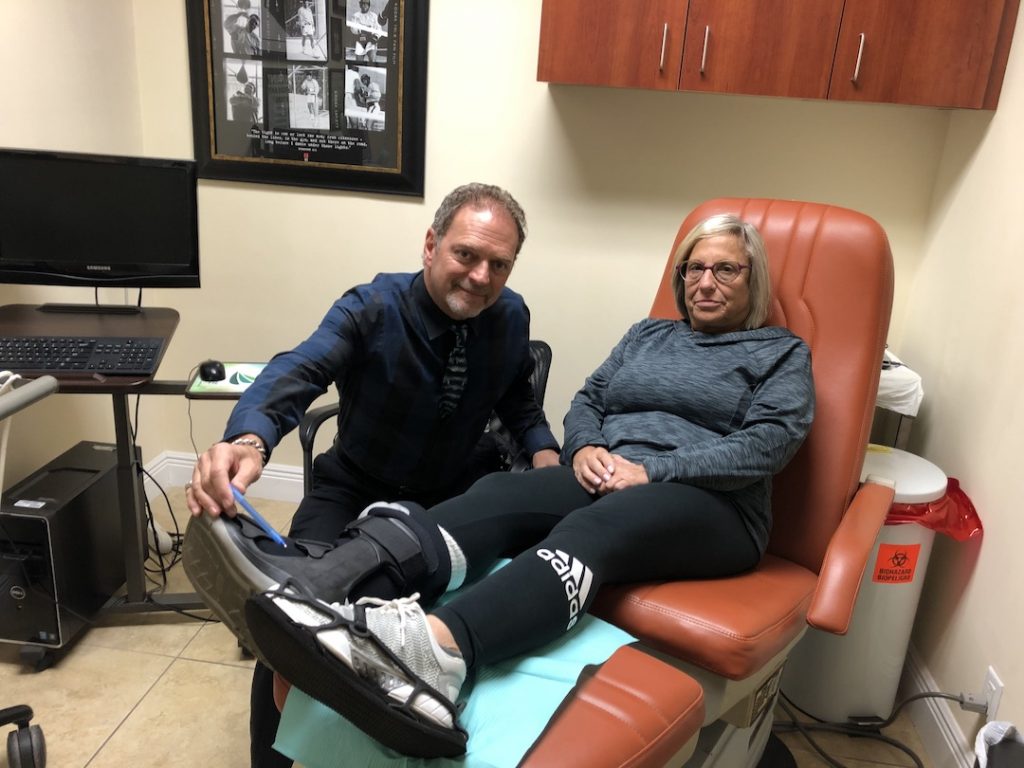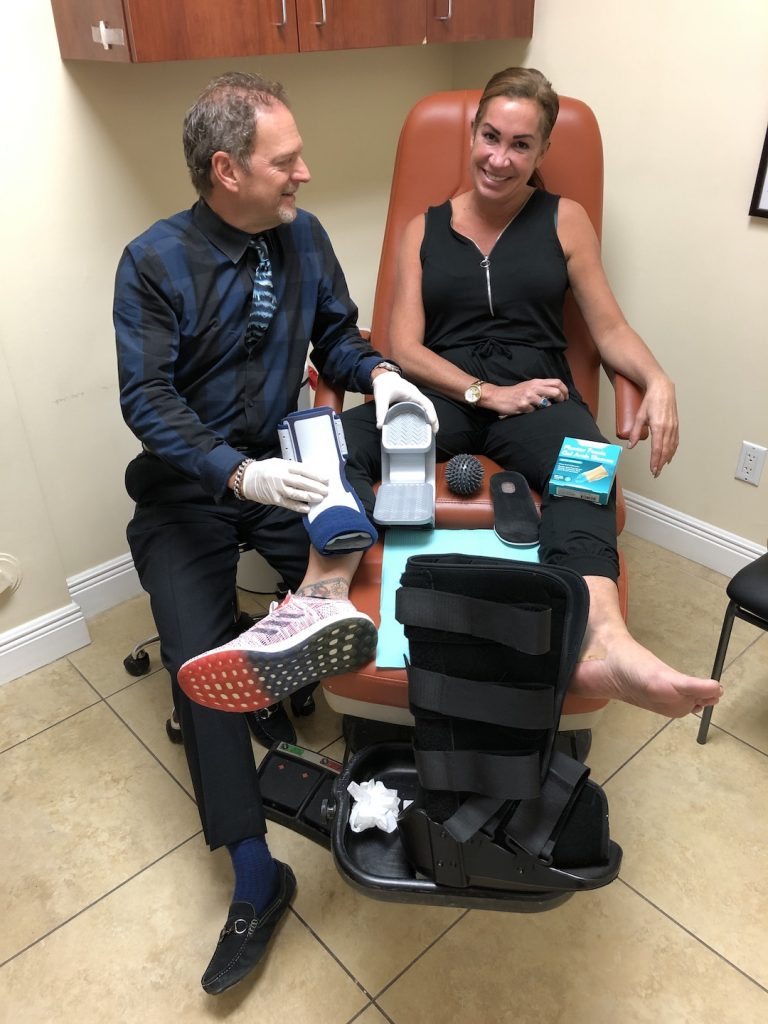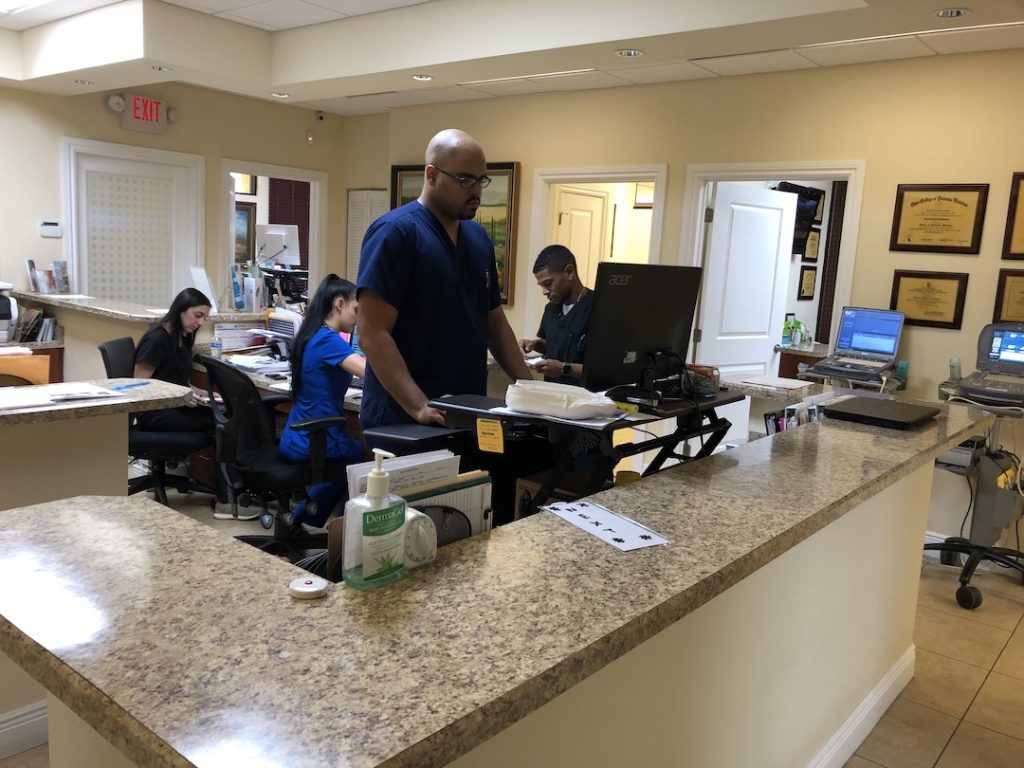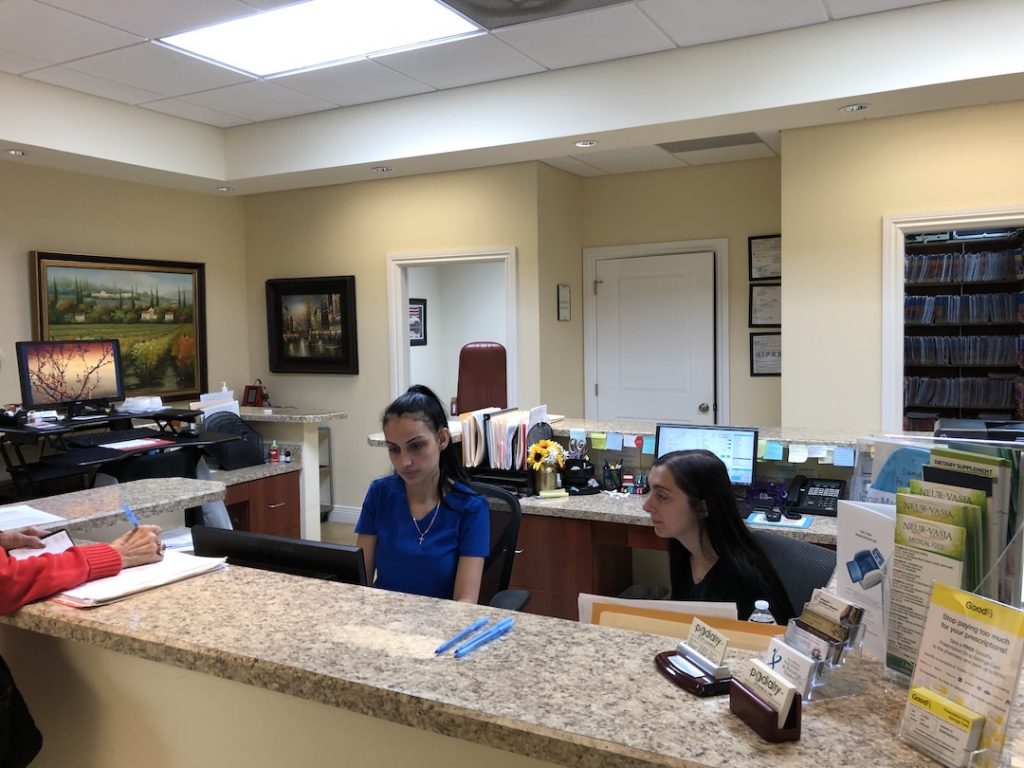If you have foot pain or foot problems, read this post to get answers to FAQs about foot care and learn how to find the best Podiatrist, also referred to as “foot doctor”, in your area (…and Delray Beach for our South Florida readers).
Are you suffering from foot pain? Do foot problems make carrying on with your daily routine difficult or troublesome? If the answer is yes, it is time to see a foot doctor. Your feet are the foundation of your body. They are the first link in your kinetic chain, so it is vital that you take any foot problem seriously…
That said, you probably have some questions that you want answered before you even step into a doctor’s office, especially a foot doctor if you’ve never been to one.
So, let’s go over some common questions that people have in regards to foot care. Then, let’s find out how to choose the best foot doctor near you – if you live in Delray Beach, the answer is simple, Delray Beach Podiatry, and you are about to learn why…

What kind of doctor should I see for foot pain?
If you have foot pain, you will want to see a “foot doctor”…
A foot doctor is called a podiatrist.
A podiatrist is a physician (doctor AND surgeon) that specializes in the diagnosis and treatment of disorders, conditions, and injuries of the foot, ankle and lower extremity.

Why should I go to a Podiatrist and not my Primary Care Doctor?
Although you can first go to your primary care doctor (general practitioner or GP) if you are experiencing issues with your feet, they are likely to refer you to a podiatrist, as podiatrists are undoubtedly who you should see if you have a problem relating to your foot, ankle, or lower extremity.
In fact, when it comes to the lower extremities, there are many things that are beyond the scope of a GP’s practice.
The best way to understand this is by looking at a GP’s medical education and comparing it with a Podiatrist.
General Practioner vs Podiatrist: Medical Education
A general practitioner attends 4 years of college, 4 years of medical school, and 3 to 7 years of residency training. Throughout this time, they are learning about the entire human body.
A podiatrist has the same number of years studying and gaining experience, but instead of learning about the entire human body, the bulk of their graduate study and residency is focused on the feet and ankles. Thus, they are a specialist in the field of the lower extremity.
To put it into perspective, if a general practitioner spends 40 hours a week studying the whole body, they would only be able to dedicate 1 or 2 hours to the feet and ankles, likely even less. Because of limited time, they will put most of their focus on understanding how to diagnose and treat the most common illnesses that affect people.
Conversely, if a podiatrist has 40 hours, it is nearly all spent on the feet and ankles. This means that a podiatrist will have far more knowledge and experience with anything that relates to the lower extremity, such as fractures, tendinitis, bunions, gout and how specific illnesses affect the feet and ankles.
Podiatrists are also surgeons!
What’s more, a podiatrist differs from a general practitioner (and a medical doctor) in another significant way. Podiatrist are also surgeons.
So, while your GP or MD can advise you with conservative treatments and prescription medicine, they can not advise you or assist you in any way with foot or ankle surgery.
Podiatrists, on the other hand, are surgical specialists for the feet, ankles and lower extremities. They can handle a wide range of surgical needs, such as surgery for plantar fasciitis, arthritis, Achilles tendon disorders, foot and ankle fractures, deformities and structural abnormalities, bunions, hammertoes, and much more.
Thus, by going to a podiatrist, you can cure your foot problem all in one place. Start to finish. And most importantly, you will have the peace of mind that you are getting the proper treatment that your foot needs.

What foot problems does a podiatrist treat?
Podiatrists specialize in foot and ankle injuries, foot surgery, wound care treatment, diabetic foot treatment, ingrown toenail surgery, and many other forms of foot care, such as:
- Gout
- Arthritis
- Flat feet
- Hammertoe
- Bunions
- Plantar fasciitis/heel pain
- Heel spur
- Sports injuries
- Athletes foot
- Stone bruise
Note: Podiatrists treat more foot problems than the common ones listed above. All in all, if you have any issue with your lower extremities, a podiatrist will be the doctor you want to see.
Now, let’s have a closer look at just a few of the above foot problems so we can give you an idea of the type of treatment that you will receive from a podiatrist.
Foot Injuries
Foot sprains and fractures are extremely common foot problems that podiatrists deal with.
A foot sprain is a soft tissue injury, while a fracture is an actual break in the bone.
Causes
Most foot sprains and fractures are caused during sports. For example, football players often fracture their feet and basketball players often sprain their ankles.
However, non-athletes can also injure their feet. Tripping or stumbling on uneven ground is a surprisingly common cause of foot and ankle sprains and fractures.
Symptoms
Pain, redness, swelling, bruising, and stiffness are all signs of sprains and fractures.
After employing the RICE method (rest, ice, compression and elevation), if you have an increase in the symptoms, it is definitely a sign that you should see a podiatrist.
Best podiatrist for ankle fractures in Delray Beach.
Treatment
A podiatrist will examine your feet and ankles and then run an X-ray, ultrasound and/or MRI test to determine the extent of the injury.
Treatment will depend on the grade of injury. Podiatrists diagnosis injuries based on grades from “1 to 3” – 1 being mild and 3 being more severe.
Depending on the injury, you may simply be instructed to stay off your foot for a period of time and be given a special boot or cast to immobilize the area.
For those with serious ankle injuries, a podiatrist will perform ankle surgery if needed. Every case is different, but podiatrists will always have your best interest in mind and will implement the least invasive treatment.
Below you can see a patient of Delray Beach Podiatry wearing a cam walker for a fracture with a slip on the other foot called an “Even Up”. This allows the patenting to be balanced when walking, taking pressure off the lower back – When choosing the best foot doctor in Delray Beach, you are guaranteed the most up-to-date and innovative treatment in foot care.

All in all, it is imperative that you don’t neglect treatment as chronic foot and ankle pain can lead to impaired functioning, deformity or infections of the foot. It can also lead to structural changes in other joints if you compensate your movement patterns to manage the pain. Your body has a kinetic chain that starts with your ankle joint, so be sure to treat them well.
Plantar Fasciitis
Plantar fasciitis is one of the most common causes of heel pain. It relates to an inflammation of the thick band of tissue that supports the underside of your foot and connects your toes (plantar fascia) to your heel bone.
Causes
When your fascia gets overstretched, tiny tears can occur on its surface. This can cause pain and inflammation.
Although anyone can succumb to plantar fasciitis, it is most common in women, people between the ages of 40 to 60 years old, those who are obese, and people with high arches or flat feet.
Other risk factors include tight Achilles tendons, abnormal walking or foot positioning, standing for long hours every day, and those who wear worn-out shoes with thin soles and women who wear high-heels often.
Treatment
Treatment for plantar fasciitis involves icing the area, rest, and NSAIDs like ibuprofen.
If you visit the best podiatrist (Delray Beach Podiatry), they are sure to help speed up your recovery with physical therapy, supportive shoes and inserts, night splints, and other effective “tools”, as seen below.

Diabetes Neuropathy Foot Pain
Diabetic neuropathy is a common yet serious complication of type 1 and type 2 diabetes. It is a kind of nerve damage caused by long term high blood sugar levels.
Symptoms
For people with diabetes, neuropathy typically appears gradually. The condition usually progresses slowly, sometimes over several decades.
If you have diabetes and you notice numbness, tingling, pain or weakness in your feet, you should definitely see a podiatrist as these are early signs of neuropathy…
If you can’t feel pain in your feet, you may very well develop ulcers under your foot. In severe cases, you will be vulnerable to infections and injuries too.
Treatment
Podiatrists will begin by diagnosing you with diabetic neuropathy. This involves questions about your medical history and symptoms, physical examination, and a test to check your level of sensitivity to temperature and touch, among other things.
Podiatrists often do a filament test to check the sensitivity of your feet.
Although there is no cure for diabetic neuropathy, a podiatrist will help you decrease and slow down the progression.
They will help you keep your blood sugar levels in check and will treat your pain. This may involve wound care treatment for non-healing ulcers, and synthetic grafts for ulcerations for those who needed it.
Podiatrists will also help prevent these issues with circulator booty therapy and special shoes like diabetic extra depth shoes with inserts if needed.
All in all, if you have any concern about diabetic neuropathy, it is imperative that you visit the best podiatrist, as they will take the necessary steps to make sure you can go on leading a pain-free, healthy life.
If you have diabetes, it is critical that you choose the best podiatrist to keep neuropathy in check, and we are confident when we say Delray Beach Podiatry is the place you want to choose.

Other common foot problems podiatrist treat
- Blisters
- Warts
- Corns
- Heel spurs
- Dry or cracked skin on your heels
- Flat feet
- Neuromas
- Calluses
- Bunions
- Nail infections
- Foot infections
- Smelly feet
Other more specific issues include tumors, wound care, ulcers, and even structural issues to fix walking patterns.
When it comes to foot issues, the best doctor is always going to be a foot doctor – learn about Delray Beach’s favorite Podiatrist, Dr Ian Goldbaum.
Risk factors
There are some general risk factors that should be considered.
- Athletics
- Obesity
- Diabetes
- Heart disease
- High cholesterol
- Arthritis
- Wearing shoes that are too small or lack support
A podiatrist will ask about your lifestyle habits and any chronic illnesses that you know of so they can focus on the source of the problem as to reach a diagnosis and make a plan of action for treatment.

When should I see a podiatrist?
Here are a few reasons that you should visit a podiatrist. This should help you determine whether or not you should schedule an appointment.
- If you have regularly occurring foot pain, or foot pain that has lasted more than a few days, you should book an appointment with a podiatrist. They will help figure out the source of the issue so you can cure your foot pain. Long-lasting foot pain can lead to other serious complications. If your foot pain is affecting your daily life, it’s time to immediately book an appointment with a podiatrist. Book an appointment with one of the best foot doctors in Delray Beach
- If you have flat feet you should see a podiatrist, as they will make sure you have the proper foot support. Doing this can tremendously change the way you move. It will also help prevent and fix any changes that other joints face due to flat feet walking patterns.
- People with diabetes should regularly visit a podiatrist. Routine visits will help prevent serious issues that can be caused by diabetic neuropathy. You will definitely want the best foot doctor for this, so if you are in Broward County, Florida, contact Delray Beach Podiatrist now.
On the whole, if you’ve noticed changes in your feet, whether there is pain or not, you should book an appointment with a podiatrist.
Even if you don’t have any foot problems, if any of the risk factors mentioned above apply to you, you should visit a podiatrist monthly, bi-yearly or at the very least yearly. Remember, feet are the foundation of your body – Healthy feet leads to a healthy life!
How to choose the best Podiatrist
There are a few things you will want to look for when choosing a podiatrist:
Education & Experience: A podiatrist should be very open about their education and work history. Be sure to look into this so that you know you are being treated by an absolute medical professional.
Specialities: Look into the services the podiatrist provides. Make sure they are specialist in the area you need help with (that is, if you know what you foot problem is). Overall, you can reach out and ask them what their specialties are. A good podiatry office with be transparent with their specialization(s). This is especially important for serious foot and ankle matters. Best foot doctor in Delray Beach – Service Specializations.
Reviews: Do a Google search and read reviews written about the podiatrist in question. A reputable podiatrist’s office will have plenty of reviews for you to read.
Convenience: Ideally, you’ll want a location that is convenient. But it’s not only about the location, office hours and ease of booking an appointment is equally as important.

Best Foot Doctor in Delray Beach
If you live in Delray Beach or Broward County, Delray Beach Podiatry is unquestionably the best foot doctor in the area.
Delray Beach Podiatry has the best foot doctors in all of South Florida.
All of our doctors have extensive education and experience. We have an excellent reputation in the community. You can read our reviews here. Furthermore, we accept most insurance plans!
No referrals needed like some other podiatrists – our goal is to make the process as simple as possible so we can provide you with the best, world-class foot care.
Our office is conveniently located at 16244 S Military Trail #290, Delray Beach, FL 33484.
Booking appointments with us is super easy and it can be done online.
How much does a visit with a podiatrist cost? Give us a call at (561) 499-0033 for information on insurance and how much a visit will cost.

No responses yet